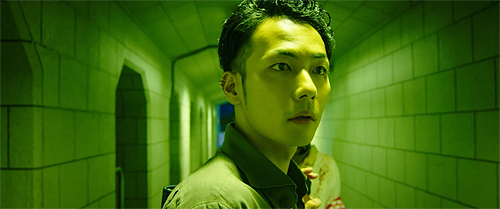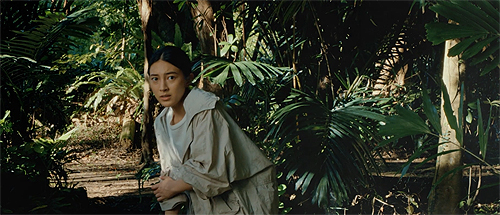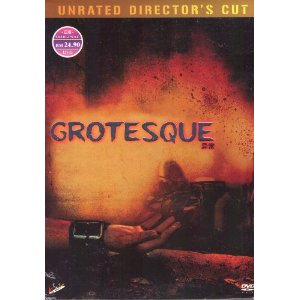Love Will Tear Us Apart (2023)
Directed by: Ken’ichi Ugana
Written by: Ken’ichi Ugana
Starring: Akaji Maro, Mitsuru Fukikoshi, Sayu Kubota, Yuzu Aoki
Coming Soon to UK Streaming
Abusive parents, bullies, con artists, and creepy drunks might not seem like the most appropriate subjects for a slasher-comedy hybrid, but writer and director Ken’ichi Ugana gives it his best shot. To say the end results are uneven might be stating the obvious. This is a strange blend of plot clichés you’ve probably seen elsewhere, with added black comedy violence. At just under ninety minutes it doesn’t outstay its welcome, but then it doesn’t really ever explore any potential themes very deeply either. Of course eclectic genre mash-ups are also something you’ve seen elsewhere if you’ve ever taken a trip into the Japanese realm of horror cinema. Let’s take a look at whether this particular example distinguishes itself from its contemporaries or whether it’s a mixed bag.

Young Wakaba and her timid classmate Koki are troubled children facing all the usual problems you can think of in a prelude to violence. Wakaba’s mother is weak and timid while her father is an abusive layabout. Koki fails to face up to school bullies who only get worse when Wakaba tries to stand up for him. Meanwhile Koki’s own mother seems to live in squalor alone and complains about the fact that he was even born. Even their teacher seems to be a totally inept example of adult authority, so it’s no surprise that Wakaba dreams of marrying a pop idol. However this often grim prologue is all a set up for what’s to come, and after a fairly shocking opening sequence seven years pass.
Adult Wakaba (Sayu Kubota) seems to have forgotten her old infatuation and finds herself taking a trip with another kind of music group. Unfortunately for Wakaba and her friend Kanna (Riko) this all seems like a trick by a creepy group hoping to lure women to a secluded cabin. The standard kind of drunken behaviour begins in this first act as characters tell ghost stories and get raunchy in the woods. It serves as a kind of mini-movie as most of the usual tropes are played out in the space of about twenty minutes. There are some weird edits and there is too much screaming, but at least it’s brisk and soon gets to decapitation and mayhem.
But outside some disappointing digital effects it’s notable that the look of the film as a whole is pretty flat and clean looking. Some rather matter-of-fact deaths are certainly played for laughs with very static angles. The cabin location introduces some interesting decor and some sinister vintage toys but, for reasons that will be clear later, this place is barely in the movie. Which on the one hand is potentially self-aware, but on the other it’s lacking a specific style. As things progress the script also comes off feeling like it’s got an identity crisis which doesn’t help. It’s sometimes eccentric but it’s often too predictable and clichéd despite a lot of peculiar highlights. The way time jumps forward between each chapter also doesn’t help.

The change from a cheap woodland location to the neon lights of Tokyo is at least a visually dynamic one. Another year later (and in the finale another two for good measure) finds Wakaba in another new situation with another creepy guy. This time it’s Yuki (Shunsuke Tanaka) who is clearly a con-artist. Time passes, genres seem to shift, but the elements seem to be the same. People try and take advantage and people die. If you’ve seen any film in this vein before the whole thing will be very predictable, although there are a few minor surprises towards the end. Who is the mystery killer dressed in a fumigation outfit? Why does he appear when Wakaba is in trouble? You can probably imagine a couple of endings for this sort of storyline yourself, even during the childhood prologue.
The most interesting inclusion is Kanna’s father, (Mitsuru Fukikoshi) Detective Kamiyama, who starts to unravel as the story goes on. There’s even an odd harmonica tune that plays when he arrives on screen to underline his mental state. In terms of comedy things are fairly restrained, although one particular moment involving a search online for ‘how to defeat a serial killer’ is the biggest laugh. It’s a constantly shifting yarn in terms of the overall tone, even if so much of it is very boilerplate and the pacing isn’t ideal. Even Wakaba and Kiko’s awful parents are reframed later as pathetic figures leading to a darker touch of humour. Murder scenes are stilted and awkward, and inaction-action sequences play out with little energy.
The biggest flaw is that it could have been both weirder and much more serious. It might have been a far bleaker tale about those with power abusing people who respect them, or even a look at the dangers of celebrity worship. Instead it skirts the issues at hand rather than examining them. Likewise the extreme moments of horror, some involving saws and blenders, could have been heightened. Even the dry humour might have been more exaggerated if Insane Cop Dad and his wild tattoos were given more screen time. Still, as Wakaba wanders from one sinister weirdo to the next it’s never dull despite some rough moments. Some deaths and gags will certainly please a certain audience. For everyone else your mileage may vary but it’s still a bloody, often silly, film that’s worth checking out even if it’s all pretty thin.
Rating: 














Be the first to comment